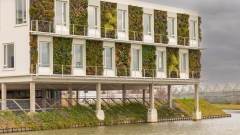At UN General Assembly, Guterres warns leaders that nations are ‘gridlocked in colossal global dysfunction’, under shadow of Ukraine war.
Published On 20 Sep 2022
In an alarming assessment, the head of the UN has warned world leaders that nations are “gridlocked in colossal global dysfunction” and are not ready or willing to tackle the challenges that threaten humanity’s future.
“Our world is in peril — and paralysed,” he said on Tuesday.
The 77th United Nations General Assembly (UNGA) meeting of world leaders convenes under the shadow of Russia’s war in Ukraine, which has unleashed a global food crisis and opened fissures among major powers in a way not seen since the Cold War.
Speaking at the opening of the annual high-level meeting in New York City, Secretary-General Antonio Guterres started his remarks by sounding a note of hope.
He showed a photo of the first UN-chartered ship carrying grain from Ukraine — part of the deal between Ukraine and Russia that the UN and Turkey helped broker — to the Horn of Africa, where millions of people are on the edge of famine. It is, he said, an example of promise and hope “in a world teeming with turmoil”.
He stressed that cooperation and dialogue are the only path forward to maintain global peace — two fundamental UN principles since its founding after World War II. And he warned that “no power or group alone can call the shots”.
“Let’s work as one, as a coalition of the world, as united nations,” he urged leaders gathered in the vast General Assembly hall.
“The divergence between developed and developing countries, between North and South, between the privileged and the rest, is becoming more dangerous by the day,” the secretary-general said.
“It is at the root of the geopolitical tensions and lack of trust that poison every area of global cooperation, from vaccines to sanctions to trade.”
Calls for end to Russia-Ukraine war
At the top of the agenda for many is Russia’s February 24 invasion of Ukraine, which not only threatens the sovereignty of its smaller neighbour but has raised fears of a nuclear catastrophe at Europe’s largest nuclear plant in the country’s now Russia-occupied southeast.
The loss of important grain and fertiliser exports from Ukraine and Russia has triggered a food crisis, especially in developing countries, and inflation and a rising cost of living in many others.
King Abdullah II of Jordan said the pandemic, exacerbated by the crisis in Ukraine, has disrupted global supply chains and increased hunger. Many well-off countries experiencing empty food shelves for the first time “are discovering a truth that people in developing countries have known for a long time — for countries to thrive, affordable food must get to every family’s table,” he said.
“On a global level, this demands collective measures to ensure fair access to affordable food, and speed the movement of staples to countries in need,” Abdullah said.
Turkish President Recep Tayyip Erdogan urged world leaders at the UN headquarters on the need for a peaceful solution to the war on Ukraine, stopping short of providing any tangible steps.
“That may not necessarily be reflective of Turkey’s shortcomings, in so much as it is a fact of where we are right now where no body or country has been able to find practical steps to put an end to this war,” said Al Jazeera correspondent Jamal Elshayyal.
“That said, maybe Ankara’s position is a lot more promising than others in that it has succeeded in finding common ground to some of the knock-on effects of this war, particularly with regards to food security and the global supply chain of grain and other important things coming out of there,” he added.
“Ultimately Erdogan’s main message to delegates was one of seeking support for his country’s attempt at conflict resolution.”
‘Sham’ referendum plans
The assembly comes as officials in four Russian-controlled regions in eastern and southern Ukraine said they will hold referendums on becoming part of Russia from September 23 to 27, which could set the stage for Moscow to escalate the war.
NATO chief Jens Stoltenberg called the referendum plans a “sham”.
“Such referenda have no legitimacy because they are sham referenda,” he told Al Jazeera.
“They will not change the nature of the war. This remains a war of aggression against Ukraine and it represents an escalation because if suddenly these territories, which are part of Ukraine, are declared as part of Russia, that will further escalate the conflict.”
Meanwhile, French President Emmanuel Macron made an impassioned speech to the assembly, saying no country can stand on the sidelines in the face of Russia’s aggression.
He accused those who remain silent of being “in a way complicit with a new cause of imperialism” that is trampling on the current world order and is making peace impossible.
Source
:
Al Jazeera and news agencies

